AREA OF PARALLELOGRAM
Subscribe to our ▶️ YouTube channel 🔴 for the latest videos, updates, and tips.
A parallelogram is a quadrilateral in which opposite sides are parallel and equal in length.
In other words opposite sides of a quadrilateral are equal in length, then the quadrilateral is called a parallelogram.
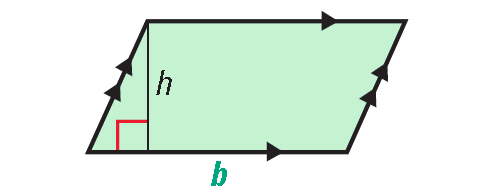
The area of a parallelogram is the product of a base and its corresponding height.
Then, the formula to find area of a parallelogram is given by
A = b ⋅ h square units
We can justify the area for parallelogram as follows.
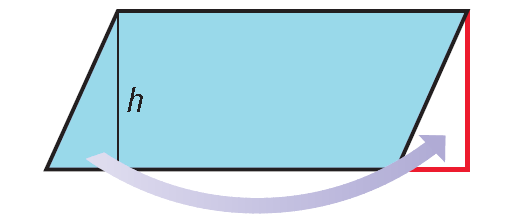
The area of a parallelogram is the area of a rectangle with the same base and height.
Examples
Example 1 :
Find the area of the parallelogram ABCD shown below.
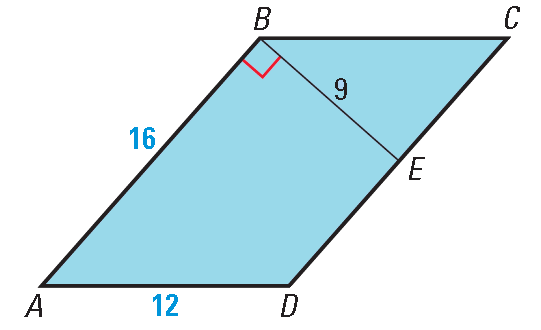
Solution :
Method 1 :
Use AB as the base.
So, b = 16 and h = 9.
Formula for area of a parallelogram is
= b ⋅ h
Substitute the given measures.
= 16 ⋅ 9
= 144 square units
Method 2 :
Use AD as the base.
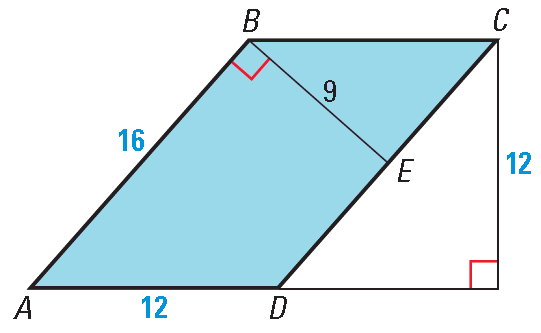
So, b = 12 and h = 12.
Formula for area of a parallelogram is
= b ⋅ h
Substitute the given measures.
= 12 ⋅ 12
= 144 square units
Example 2 :
Find the area of the parallelogram ABCD shown below.
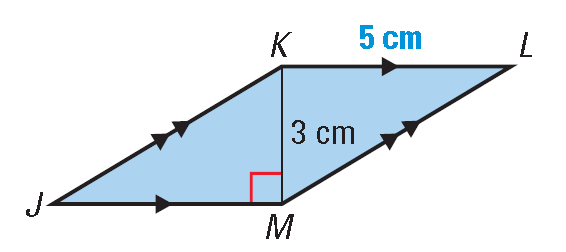
Formula for area of a parallelogram is
= b ⋅ h
Substitute b = 5 and h = 3.
= 5 ⋅ 3
= 15 square units
Example 3 :
A mirror is made of two congruent parallelograms as shown in the diagram. The parallelograms have a combined area of 9 1/3 square yards. The height of each parallelogram is 1 1/3 yards. How long is the base of each parallelogram ?
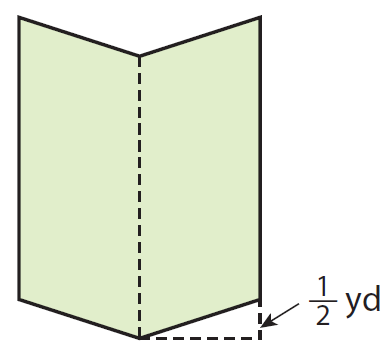
Solution :
Because the given parallelograms are congruent area of two parallelogram will be equal.
Combined area of parallelograms = 9 1/3 square yards
Combined area of parallelograms = 28/3 square yards
Area of one parallelogram = (28/3) ÷ 2
Area of one parallelogram = 14/3
b ⋅ h = 14/3
b ⋅ 1 1/3 = 14/3
b ⋅ 4/3 = 14/3
Multiply each side by 3/4.
b = 14/3 ⋅ 3/4
b = 14/4
b = 7/2
b = 3 1/2
So, the base of the parallelogram is 3 1/2 yards.
Example 4 :
Find the base of a parallelogram if its area is 40 square cm and its altitude is 15 cm.
Solution :
Area of a parallelogram = 40 cm2
b ⋅ h = 40
Here, altitude (or) height (h) = 15 cm.
b ⋅ 15 = 40
Divide each side by 15.
b = 2.67
So, the base of the parallelogram is 2.67 inches.
Example 5 :
Find the area of the shape shown below.
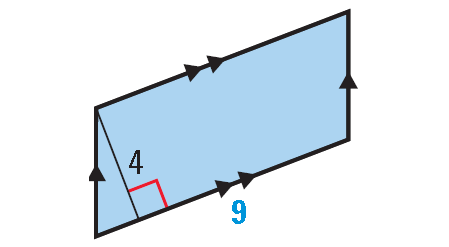
The above shape has four sides. So, it is a quadrilateral. Because the opposite sides are parallel, the above quadrilateral is a parallelogram.
Formula for area of a parallelogram is
= b ⋅ h
Substitute b = 9 and h = 4.
= 9 ⋅ 4
= 36 square units
Example 6 :
If the area of the shape shown below is 60 square inches, then find the value of x.
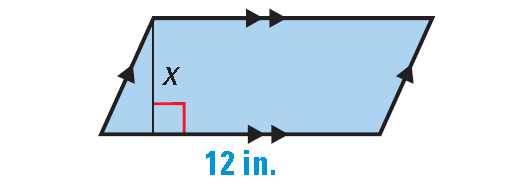
Solution :
Given : Area of the above shape is 60 square inches.
The above shape has four sides. So, it is a quadrilateral. Because the opposite sides are parallel, the above quadrilateral is a parallelogram.
Area = 60 in2
b ⋅ h = 60
Substitute b = 12 and h = x.
12 ⋅ x = 60
Divide each side by 12.
x = 5
Example 7 :
You make a photo prop for a school fair. You cut a 10-inch square out of a parallelogram-shaped piece of wood. What is the area of the photo prop?
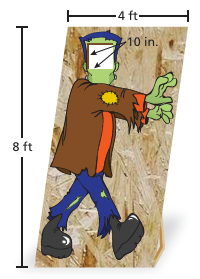
Solution :
Convert the dimensions of the piece of wood to inches.
12 inches = 1 foot
Base = 4 ⋅ 12
= 48 inches
Height = 8 ⋅ 12
= 96 inches
= area of wood − area of square
= 96(48) − 102
= 4608 − 100
= 4508
Example 8 :
The area of a parallelogram can be expressed as the binomial 2x2 − 10x. Which of the following could be the length of the base and the height of the parallelogram?
a. 2x(x2 − 5x) b. 2x(x − 5)
c. (2x − 1)(x − 10) d. (2x − 5)(x + 2)
Solution :
Area of parallelogram = 2x2 − 10x
Factoring 2x, we get
= 2x(x - 5)
Example 9 :
The perimeter of the parallelogram below is 32 cm. What is the length of the longer side?
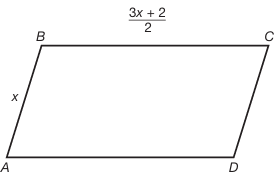
a. 9 cm b. 10 cm c. 6 cm d. 12 cm
Solution :
Perimeter of parallelogram = 32 cm
Sum of all sides = 32
x + (3x + 2)/2 + x + (3x + 2)/2 = 32
2x + (6x + 4) /2 = 32
[4x + (6x + 4)]/2 = 32
10x + 4 = 32(2)
10x + 4 = 64
10x = 64 - 4
10x = 60
x = 60/10
x = 6
So, the value of x is 6. Option c is correct.
Example 10 :
Find the area of the shaded region. You cut a 12-inch square out of the piece of wood. What is the area of the photo prop?
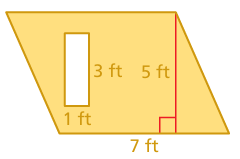
Solution :
Area of shaded region = area of parallelogram - area of rectangle
= (7 x 5) - (1 x 3)
= 35 - 3
= 32 square feet.
Subscribe to our ▶️ YouTube channel 🔴 for the latest videos, updates, and tips.
Kindly mail your feedback to v4formath@gmail.com
We always appreciate your feedback.
About Us | Contact Us | Privacy Policy
©All rights reserved. onlinemath4all.com

Recent Articles
-
Digital SAT Math Problems and Solutions (Part - 2)
Feb 19, 26 07:14 PM
Digital SAT Math Problems and Solutions (Part - 2) -
Tricky SAT Math Problems Solved Easily
Feb 19, 26 09:11 AM
Tricky SAT Math Problems Solved Easily -
Digital SAT Math Problems and Solutions (Part - 1)
Feb 18, 26 03:01 AM
Digital SAT Math Problems and Solutions (Part - 1)


